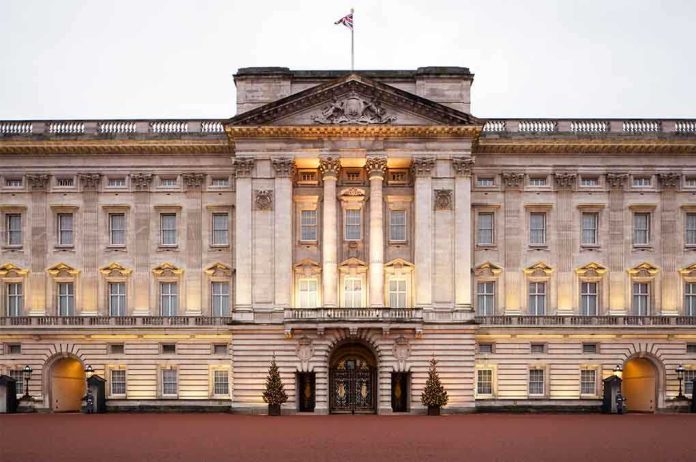
When a royal title falls, centuries of tradition tremble—Prince Andrew’s surrender of the Duke of York title amid the Epstein fallout marks the monarchy’s most seismic reckoning in modern history.
Story Snapshot
- Prince Andrew relinquishes his Duke of York title, catalyzed by the Epstein scandal.
- This is the first time a senior royal has voluntarily surrendered a dukedom due to personal controversy.
- The move follows years of public pressure, legal scrutiny, and consultation with King Charles III.
- The monarchy attempts to distance itself from scandal and reassert its commitment to accountability.
Prince Andrew’s Surrender: A Royal Earthquake
Prince Andrew’s decision to surrender the Duke of York title is not simply a personal concession; it is a headline moment that redefines the boundaries of royal accountability. The British monarchy, revered for its ability to weather storms and adapt to the times, now faces a challenge unlike any before. Andrew’s association with Jeffrey Epstein, a convicted sex offender, ignited public outrage and forced the royal family into a series of defensive maneuvers. This ultimate step—renouncing hereditary and honorific titles—puts an exclamation mark on a saga that has gripped global headlines since 2019.
Royal titles have always been more than ceremonial; they are symbolic shields of continuity and prestige. When Andrew publicly announced his resignation from his dukedom and membership in the Order of the Garter, the act sent shockwaves through both royal circles and the public. The timing is telling: October 18, 2025, after years of mounting pressure and failed attempts to quietly sideline the scandal. His statement, “I have decided, as I always have, to put my duty to my family and country first,” reflects a shift from personal denial to institutional sacrifice—a gesture intended to stem reputational hemorrhage and steer the monarchy’s focus back to its core mission.
The Anatomy of a Royal Crisis
Prince Andrew’s journey from celebrated royal to embattled figure is a study in how personal choices can unsettle the very foundations of public institutions. The Epstein scandal was not a fleeting moment; it was a slow burn, fueled by relentless media coverage and escalating public demands for transparency. Andrew’s 2019 BBC “Newsnight” interview was a turning point—it failed to soothe criticism and ultimately led to his withdrawal from public duties. By 2022, he had lost his HRH style and military affiliations, yet retained his dukedom and honorifics. The final act—surrendering those last vestiges of royal privilege—signals the monarchy’s recognition that symbolic actions matter just as much as legal outcomes.
King Charles III’s involvement underscores the delicate balance between family loyalty and institutional integrity. The monarchy’s response has been measured: private consultation, public messaging, and an unwavering focus on stability. For Andrew, the consequences are severe—his reputation is irrevocably damaged, and his role within the royal family now exists only in title, not function. For the monarchy, the episode serves as both a warning and a precedent, redefining what is acceptable behavior and the limits of hereditary immunity.
Public Reckoning and the Ripple Effect
The British public has become a powerful force in shaping royal outcomes. Calls for accountability and modernization are no longer fringe sentiments—they are mainstream expectations. Andrew’s surrender of titles is, in part, a response to this groundswell, an attempt to restore faith in an institution that relies on public consent for its survival. The monarchy’s reputation, once bolstered by mystique and tradition, now hinges on its willingness to confront uncomfortable truths and respond to societal demands.
The legal ramifications for Andrew remain unresolved. While relinquishing titles may ease institutional pressure, it does not shield him from ongoing investigations or potential future litigation. Victims and their advocates see the move as a step toward justice, albeit a symbolic one. The episode also has economic and social consequences—tourism linked to Andrew’s legacy may decline, debates about the monarchy’s relevance intensify, and republican sentiment gains new momentum. In the broader context, public figures across sectors are facing heightened scrutiny, and institutions founded on privilege are being asked to justify their place in modern society.
Expert Analysis: Accountability and the Future of the Monarchy
Royal commentators describe Andrew’s surrender of the Duke of York title as “unprecedented,” a moment that could reshape the monarchy’s relationship with its subjects. Legal experts note that while titles confer status, they do not confer immunity—ongoing legal matters will unfold irrespective of royal protocol. Historians point to the rarity of such a move, especially in a family defined by tradition and continuity. Sociologists suggest that the event reflects a broader cultural shift: society now expects public figures, even those born into privilege, to answer for their conduct.
Opinions diverge on the lasting impact. Some see this as a necessary reckoning, overdue but welcome. Others argue that the gesture is largely symbolic, with deeper issues of privilege and accountability remaining unaddressed. For the monarchy, the episode presents an opportunity to recalibrate its values and demonstrate a commitment to transparency. Whether this seismic shift will yield lasting change or simply insulate the institution from immediate scandal remains an open question—one that will echo through future generations and headlines alike.












